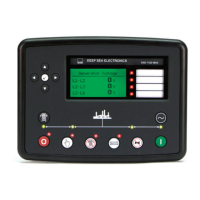Engine type Select the engine type appropriate to your system
Conventional Engine: Select this if you have a traditional (non ECU) engine, either Energise
to Run or Energise to Stop.
Conventional Gas Engine: Select this if you have a traditional (non ECU) engine and require
GAS engine functionality. This enables control of configurable outputs for Gas Choke and
Gas Ignition and instructs the module to follow the gas engine timers.
Other Engines: The list of supported CAN (or Modbus) engines is constantly updated, check
the DSE website at www.deepseaplc.com for the latest version of Configuration Suite
software.
Enhanced J1939
= The module will read ‘Basic’ instrumentation from the engine ECU and display (where
supported by the engine) :
• Engine Speed
• Oil Pressure
• Engine Coolant Temperature
• Hours Run
= The module will read and display an ‘Enhanced’ instrumentation list (where supported
by the engine) :
• Engine Speed
• Oil Pressure
• Engine Coolant Temperature
• Hours Run
• Engine Oil Temperature
• Exhaust Temperature
• Fuel Pressure
• Total Fuel used
• Fuel Consumption
• Inlet Manifold Temperature
• Coolant Pressure
• Turbo Pressure
Where an instrument is not supported by the engine ECU, the instrument is not displayed.
DSE Reserve the right to change these lists in keeping with our policy of continual
development.
Alternative
Engine Speed
= The engine is instructed to run at its Nominal Speed as configured by the Engine
Manufacturer.
= The engine is instructed to run at its Alternative Speed as configured by the Engine
Manufacturer.
Modbus Engine
Comms Port
RS485 Port: The modules RS485 port is used to communicate to the engine (when a
Modbus engine type is selected.
DSENet Port: The modules DSENet port is used to communicate to the engine (when a
Modbus engine type is selected. This ‘frees’ the RS485 port in case connection to BMS or
other RS485 compatible equipment is required.

